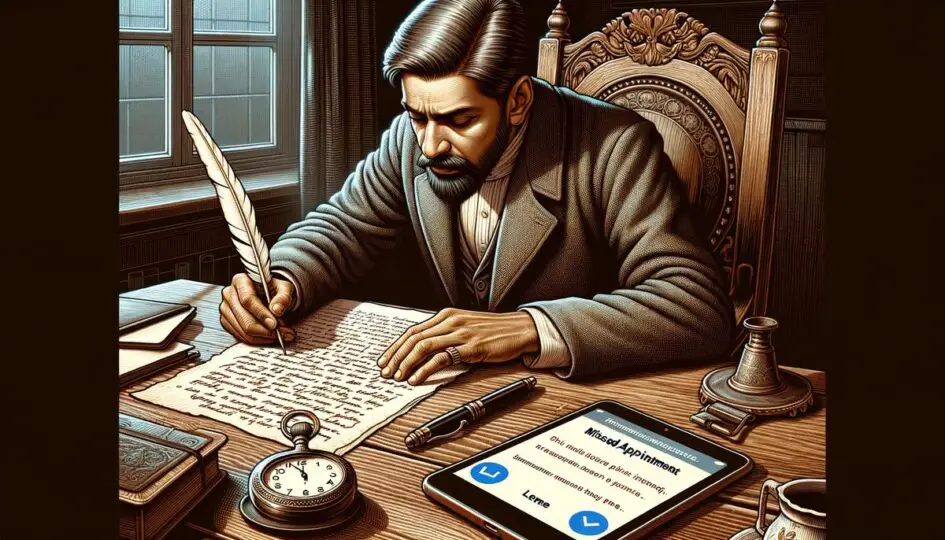Have you ever found yourself in a situation where you missed a meeting and felt unsure about the best way to handle it? It's something many of us face at one point or another. This article aims to guide you through crafting a sincere apology, communicating effectively afterward, and ensuring such instances are minimized in the future. By addressing these aspects with care and consideration, we can maintain professionalism and respect within our professional relationships.
Crafting a Sincere Apology
((TEXT START))First off, reach out as soon as possible. Timing is everything. The sooner you inform your colleagues or the meeting organizer about your absence, the better. It shows that you are responsible and that you take the situation seriously.
Start by saying "I'm sorry." These two little words can go a long way, but remember they have to be genuine. An insincere apology is pretty transparent and can make the situation worse. Be straightforward and concise – there is no need to go into too much detail or make up elaborate stories. A simple, honest apology goes a long way; respect and vulnerability are seen and appreciated.
Next, let them know why you missed the meeting – keeping it brief. Did you have an emergency? Tech problems? Simply forgot? It's okay to let them know; it offers context to your apology and shows transparency. However, avoid oversharing or crafting excuses. The aim is not to seek pity but to acknowledge your mistake openly.
Offer to make amends. This could mean asking for a brief summary of what you missed and assuring them that you'll catch up on your own. You can also propose scheduling another time if you missed something critical that requires your input or discussion. This demonstrates your commitment and willingness to ensure the meeting's objectives are still met.
Follow up accordingly. After you've sent your apology, don't let it end there. If there were action items discussed during the meeting meant for you, ask about them and ensure you follow through as promised. This shows your determination to stay on top of your responsibilities despite the hiccup.
Here's a brief email template you might find handy:
"Hello [Name],
I want to apologize for missing our meeting on [Date/Time]. Unfortunately, [brief explanation]. I understand the importance of our discussion and deeply regret any inconvenience my absence may have caused. Could we possibly review the key points I missed, or would it be possible to reschedule for a time that suits everyone? I'm eager to catch up and continue contributing to our project/goal.
Thank you for understanding,
[Your Name]"
Remember, missing a meeting isn't the end of the world, but how you handle it can really show your character and professionalism. A sincere apology reflects your integrity and helps maintain strong, respectful professional relationships. In fact, a study by the Journal of Experimental Social Psychology found that people who apologized were seen as more likeable, even when they were clearly at fault for a transgression1.
((TEXT END))
Communicating Effectively
When we miss a meeting, it's not just about making things right by saying sorry. It's also about communicating in a way that shows you're still on the team and ready to move forward with your colleagues.
Keep your tone professional yet warm in your messages. This balance shows that you take your responsibilities seriously but you're also human. It's kind of like saying, "Hey, I messed up and I'm really sorry about that," without sounding too casual or formal.
Be concise in what you communicate. After you've explained your absence briefly, get straight to what's next. This could mean:
- Asking for meeting notes
- Inquiring about any decisions made that impact your work
- Suggesting a brief catch-up call if necessary
This shows you're not only sorry but also proactive about staying in the loop.
Set up a plan to prevent the same issue from happening again. It could be as simple as updating your calendar alerts or promising to double-check your schedule more regularly. By sharing this plan, you reassure your team that you're taking steps to be more reliable.
Ask for feedback. Sometimes, missing a meeting can disrupt others' workflow. By asking how your absence affected them and if there's anything more you can do to help now, you open a communication channel for them to share their concerns.
Turn your words into actions. If you promised to take on extra work to make up for your absence, do it and do it well. If you said you'd read through the minutes of the meeting and get back with any questions, follow through promptly. Actions speak louder than words, and by following up on your commitments, you rebuild any trust that might have been shaken by your absence. Research has shown that trust is a critical factor in team effectiveness and job satisfaction2.
Remember, the way we handle the situation can make a big difference in our professional relationships. By keeping our communication clear, respectful, and proactive, we can smooth out the bumps and keep moving forward as an invaluable part of our teams.

Follow-Up After Missing a Meeting
((TEXT START))After you've sent your apology message and worked out a plan to catch up on what you've missed, keeping the professional rapport strong is key. Here's how to proceed once you're back in the loop:
Get Informed and Implement Insights:
Make sure you fully understand the meeting's outcomes. If you've received the meeting notes, study them. Should there be areas needing clarification, don't hesitate to reach out to a colleague. Once you're informed, start applying any relevant insights or decisions from the meeting to your work. Showing that you're aligned with the team's direction despite your absence demonstrates commitment and responsibility.
Contribute Back to the Team:
If the meeting involved discussions or decisions where you could add value, offer your input afterward. Maybe draft a brief report or provide feedback that aligns with the discussion points you missed. This not only shows your eagerness to contribute but also helps the team benefit from your expertise.
Plan for the Next Meeting:
Ensure you're prepared for the next meeting:
- Confirm the time and date
- Go through the agenda
- Note down any contributions you plan to make
Arriving well-prepared demonstrates you value your team's time and are committed to making positive contributions.
Show Appreciation:
If someone took extra steps to fill you in on the missed meeting, thank them. A simple note saying, "Thanks for helping me catch up," goes a long way. Showing gratitude helps solidify positive relationships and promotes a supportive work culture. Gratitude has been linked to increased job satisfaction, improved relationships, and even better physical health3.
Keep Your Promise:
Following through on any action items or commitments you made when apologizing is crucial. Make sure you complete any tasks assigned to you and those you volunteered for during your catch-up process. Delivering on your promises rebuilds trust and shows your professionalism.
Minimize Future Absences:
Work on minimizing the chances of missing future meetings. Whether it's improving time management, setting up multiple reminders, or regularly reviewing your schedule, taking proactive steps to attend meetings consistently demonstrates respect for others' time and a dedication to your role and the team's goals.
Remember, missing a meeting doesn't have to mean damaging professional relationships. With the right follow-up actions, you can maintain— and even strengthen—your rapport with colleagues while demonstrating your dedication and professionalism.
((TEXT END))
Through understanding how to craft a sincere apology, communicate effectively post-absence, and take steps to prevent future occurrences, we not only show respect for our colleagues’ time but also demonstrate our commitment to our roles. Handling missed meetings with grace and responsibility reflects positively on our character and professionalism. Remember, it’s not just about saying sorry; it’s about showing that you value your team’s efforts and are dedicated to contributing positively moving forward.
- Schumann, K. (2018). The Psychology of Offering an Apology: Understanding the Barriers to Apologizing and How to Overcome Them. Current Directions in Psychological Science, 27(2), 74-78.
- Dirks, K. T., & Ferrin, D. L. (2002). Trust in leadership: Meta-analytic findings and implications for research and practice. Journal of Applied Psychology, 87(4), 611-628.
- Emmons, R. A., & McCullough, M. E. (2003). Counting blessings versus burdens: An experimental investigation of gratitude and subjective well-being in daily life. Journal of Personality and Social Psychology, 84(2), 377-389.


Recent Comments